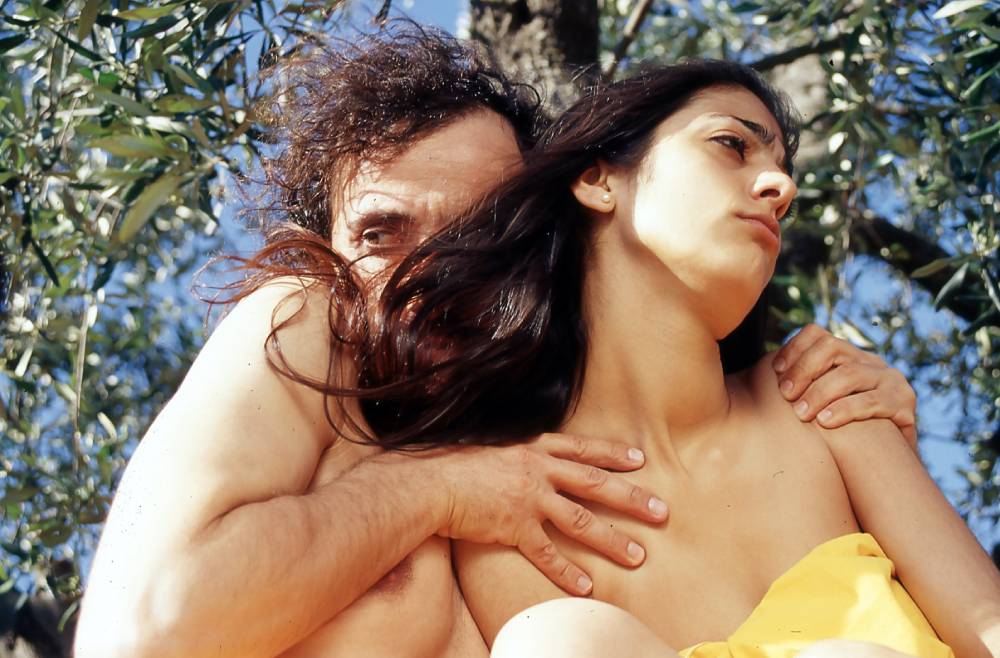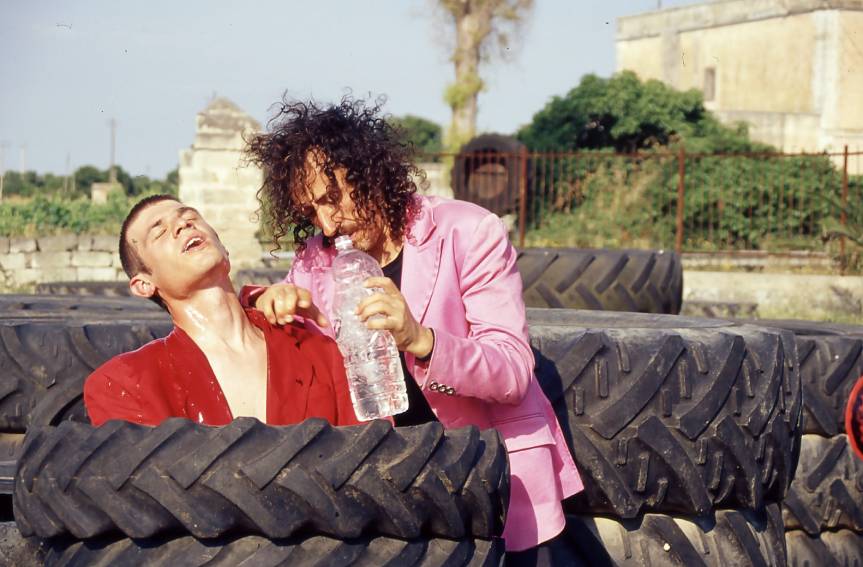Interview FLAVIA MASTRELLA and ANTONIO REZZA
Camera Lucida: Do you have any notable or major influences?
Flavia Mastrella: Antonio and I have two different formations. I’m interested in communication as well as film culture. I never lose sight of figurative art, photography, television, advertising and social media. Between the years 1990-2004 I had an enormous interest in video art: Pipilotti Rist, Magnus Wallin, Melik Ohanian, these are some of the authors imprinted in my visual memory.
Antonio Rezza: All the cinema that does not come to terms with the audience: Lynch, Kubrick, Fellini, Maresco, Pasolini and then Artaud. The uncompromising thought of Cioran and others who have never yielded to blandishment and manners.
Camera Lucida: Although it looks great and is professional in its production values, Samp has a DIY aesthetic, akin to a NO Wave or NO budget film. It even draws allusions to early films by the likes of Peter Jackson or Robert Rodriguez. Any thoughts on this?
Flavia Mastrella: Samp is self-released, it has a digital support that could be defined prehistoric but, like all our works, it runs through a stratified language, one could define it even “wrong”. It’s a really fake fiction, a true story counterfeited by the simulation.
Antonio Rezza: Samp is shot as you write a poem, with ease and selflessness. It’s like a painting, dissolved and reworked with maniacal care. It’s like us, spontaneous and obsessive. Nothing more. But, most importantly, nothing less.

Camera Lucida: Where did the idea for the story and the script of Samp come from?
Flavia Mastrella: As far as I am concerned I was inspired by the ancestral landscape of Puglia, by feeling deeply involved in the stories from “La terra del rimorso” (The Land of Remorse), written by anthropologist Ernesto De Martino. The film is also influenced by a television format that we had made the year before - “Troppolitani" - moveable interviews to people in motion. We had written a behavioural grid, a handful of questions and concepts we wanted to convey; the development was on-going performance, the construction of the dialogue was done in the editing room.
Antonio Rezza: Flavia made a location scouting in the Triana valley in the spring of 2001. The idea was born there. The screenplay is the result of a cycle of abandonment and reconnection with an on-again, off-again 20 years long work.
Camera Lucida: Was it easy casting the main character of Samp or was it a long process?
Flavia Mastrella: The idea of the killer came organically, as well as the extermination of traditions. The twin towers had just collapsed, and it was also a difficult moment in our career, we had perceived a cultural downfall in progress.
Antonio Rezza: Being me (Antonio) Samp, it was very simple. I am not an actor and therefore I am what I want to be, with immediacy and disruption. I am not too fond of actors; they do whatever comes their way, in exchange for money. I only do what I want. There is a huge difference.

Camera Lucida: How do you feel audiences should infer from this film and what would you like them to take away from it?
Flavia Mastrella: Our films are open to interpretation, we do not offer a truth, we just gather some thoughts. I would like the audience to grasp that sense of expressive liberty we encourage.
Antonio Rezza: The great sense of freedom and lack of interest in all forms of power.
Camera Lucida: What are your feelings of having the film play at Venice this year?
Flavia Mastrella: We are happy. We can finally see if our communicative experiment works, see the reactions of an audience of industry specialists and continue to seek new methods to surprise, ourselves and others. I enjoy the risk.
Antonio Rezza: I was moved by the great acclaim that welcomed the film. It's nice to feel emotions. It is very childish to vibrate to the sound of approval, but it is the only thing that keeps us attached to the animal world. And by animal I mean the human being.
Camera Lucida: Do you feel cheated a little bit by the Covid-19 crisis with less people attending the festival and getting less exposure than usual?
Flavia Mastrella: For us it is completely normal to be selected in times of crisis, it is our bizarre destiny.
Antonio Rezza: Of course, it was a penalty, but I believe that ours was the only film at the Biennale entirely produced by the authors, without any external funding. And even this should make you think. On a side note, the fact that people are crowded on the Venetian vaporetto but have to sit far away in the theatre is part of the deceitful exercise of power that dictates and brutalizes.
Camera Lucida: You also do plays for the Theatre. In the future do you think you will continue with plays, Television and various length films, or would you prefer to focus on one particular medium?
Flavia Mastrella: The future is cloudy.
Antonio Rezza: I’d rather make films all the time. We abandoned cinema in 2001, Samp is from that period. Unfortunately, cinema is a medium that is not very inclined to freedom. So I think we will return to doing everything as usual, mixing experiences, to reach a goal that never existed.
Steven Yates


